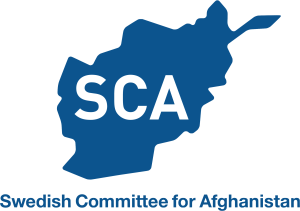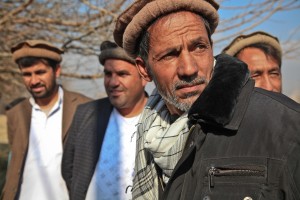 With a focus on promoting the full inclusion in society of the most vulnerable groups, including rural populations, women, children, and those with disabilities, independent non-governmental organization the Swedish Committee for Afghanistan (SCA) manages development programs that impact more than 2,000 villages across 14 Afghan provinces. Formed in Sweden in 1980 to advocate for the withdrawal of Soviet forces from Afghanistan, SCA began providing emergency aid to Afghans in 1982.
With a focus on promoting the full inclusion in society of the most vulnerable groups, including rural populations, women, children, and those with disabilities, independent non-governmental organization the Swedish Committee for Afghanistan (SCA) manages development programs that impact more than 2,000 villages across 14 Afghan provinces. Formed in Sweden in 1980 to advocate for the withdrawal of Soviet forces from Afghanistan, SCA began providing emergency aid to Afghans in 1982.
SCA’s activities broadened rapidly over the following years, leading to a transition from a primarily service-delivery oriented humanitarian assistance approach to a cooperative development model that emphasizes capacity building and the participation of rural communities, civil society groups, and individuals in the positive transformation of Afghan society.
Along with its headquarters in Kabul, SCA maintains five regional management offices and three liaison offices. Of the more than 5,000 SCA staff members working in Afghanistan, 99 percent are Afghans. In its management office in Stockholm, Sweden, 20 employees perform administrative and logistical functions. Additionally, roughly 4,000 SCA members in local chapters across Sweden conduct awareness and fundraising campaigns to increase support for the Afghan people among the European public.
The organization is guided by the vision of a peaceful, equitable Afghan society in which human rights are protected and all citizens have access to economic opportunities and essential resources. To meet this goal, SCA operates programs in the domains of health care, rural livelihoods, education, and community governance.
SCA undertakes all projects in direct partnership with the affected communities and cooperates with government agencies to help carry out capacity development and the provision of basic services in remote areas. In working with the people of Afghanistan, SCA honors their right to self-determination, treats people of all backgrounds equally, and maintains an understanding and respect for local cultural and religious customs.
Securing Access to Quality Health Care
Though Afghanistan’s medical sector has made progress over the last decade, the general quality of services falls below optimal standards, and many Afghans have limited access to health care. While overall life expectancy has risen, child mortality rates remain high in comparison with global averages. Estimates also indicate that 77 percent of the need for reproductive care goes unmet.
SCA seeks to address these shortcomings by aligning health services with the particular needs of different communities, concentrating on the most at-risk members of target populations. Through outreach work conducted by about 1,000 locally-based medical professionals, SCA delivers basic care and provides information to community members that heightens their understanding of preventive health measures. Efforts are also made to involve local residents in advocating for adequate, accountable health services.
As a contractor for the Ministry of Health in 2014, SCA maintained full responsibility for health care delivery in Laghman and Wardak provinces under the government’s Basic Package of Health Services and Essential Package of Hospital Services. SCA operated 103 medical facilities under this arrangement, and by the end of the year had treated more than 1.8 million patients in the two provinces.
To counter discrimination against those with disabilities in health care delivery, SCA organizes information sessions to educate medical professionals on the rights of people with disabilities. SCA also designs and builds clinical facilities to be accessible by all patients and trains personnel to accommodate persons with disabilities.
Equipping Rural Residents for Diverse Vocations
 War and natural disasters have ruined integral infrastructure relied upon by Afghans, the majority of whom make their living through agricultural production. Recognizing that, SCA helps communities in isolated and insecure areas strengthen their capacities and incorporate diversified sources of income. SCA empowers rural community organizations and residents to manage their own development through means ranging from support of village savings and loans associations, to assistance with upgrading water supply and irrigation systems.
War and natural disasters have ruined integral infrastructure relied upon by Afghans, the majority of whom make their living through agricultural production. Recognizing that, SCA helps communities in isolated and insecure areas strengthen their capacities and incorporate diversified sources of income. SCA empowers rural community organizations and residents to manage their own development through means ranging from support of village savings and loans associations, to assistance with upgrading water supply and irrigation systems.
In 2014, SCA initiated a pilot project in the province of Balkh to enhance the livelihoods of residents in 10 villages. Limited access to education and lack of business acumen present significant barriers to economic development in rural Afghanistan, so the Balkh project included vocational education as a major component.
As a result of the project, over 450 households benefited from instruction in vegetable cultivation, soap production, poultry farming, and a variety of crafts. Furthermore, among Balkh village residents with disabilities, nearly 540 individuals completed apprenticeships or training programs and more than 660 received loans to pursue existing or new business ventures.
Fostering Inclusive, Community Based Education
Combined with a shortage of schools and insufficiently trained teachers, factors such as poverty, child labor, and ongoing conflict limit academic opportunities for children in Afghanistan, a country where close to half of the population is under the age of 15. SCA responds to this situation primarily through inclusive community based education (CBE) intended for all children in rural communities.
Adaptable to the resources present in a given community, CBE schools conduct classes in proper educational facilities, houses, or outdoors. At the 433 CBE schools supported by SCA in 2014, more than 74,700 children received instruction in 1,938 total classes.
Since children in Afghanistan with disabilities often face prejudices that prevent them from attending school with their peers, SCA operates preparatory schools for these children and facilitates their subsequent integration into regular classes. SCA’s commitment to inclusive education also includes training teachers in the use of braille and sign language, engaging community leaders in advocating for the education of children with handicaps, and running special classes for thousands of children from the nomadic Kuchi people.
Strengthening Community Governance
Holding that all Afghans need to have a voice in shaping their society in order for progress in Afghanistan to continue, SCA promotes the participation of conventionally marginalized groups in democratic community planning. By training local development councils in such matters as conflict resolution, nondiscrimination, and environmental management, SCA helps prepare councils to administer their own development projects while maintaining accountability to all members of the community.
SCA also works to increase the capacities of local authorities and to improve their responsiveness to the demands of the communities they serve. Through its Northern Rural Project, SCA provided public outreach, aid coordination, and good governance training to 81 officials of local and district agencies. During development project implementations, regular cooperative monitoring of projects by SCA and local authorities has helped resolve both technical issues and conflicts encountered by the involved communities.

